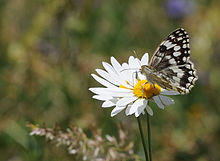Melanargia larissa
| Balkan marbled white | |
|---|---|

| |
| Scientific classification | |
| Domain: | Eukaryota |
| Kingdom: | Animalia |
| Phylum: | Arthropoda |
| Class: | Insecta |
| Order: | Lepidoptera |
| Family: | Nymphalidae |
| Genus: | Melanargia |
| Species: | M. larissa
|
| Binomial name | |
| Melanargia larissa (Geyer, 1828)
| |
| Synonyms | |
| |
Melanargia larissa, the Balkan marbled white, is a butterfly in the family Nymphalidae. It is found from south-eastern Europe (Croatia, Serbia, Albania, Bulgaria, Greece) and Asia Minor to Transcaucasia and north-western Iran.[1] The habitat consists of dry grasslands, scrubby hillsides and grassy woodland glades.[2][3] Adults are on wing from mid-May to July in one generation per year.[4]
The wingspan is about 52 mm. The nymotypical form larissa Hbn. (38f) is easily recognized by the strongly sooty blackening of the bases of the wings, only the cell having some light places left...the forms allied to larissa can be separated from the japygia- forms only withdifficulty and some arbitrariness. The transverse cell-bar of the forewing is not so close to the centre of the cell, being apparently a little shifted towards the apex of the same, and the median band of the hindwing has a somewhat different position, but also varies rather considerably.The countries inhabited by the forms of larissa are more or less grouped around the Black Sea, while the distribution area of the japygia -forms encircles that of larissa in a wide arch.[5]
The larvae feed on Brachypodium species.[6]
Subspecies
- Melanargia larissa larissa
- Melanargia larissa grumi Standfuss, 1892
- Melanargia larissa hylata (Ménétriés, 1832) (Turkey and Iran)
- Melanargia larissa iranica Seitz, 1907
- Melanargia larissa karabagi Koçak, 1976 (Turkey)
- Melanargia larissa kocaki Wagener, 1983
- Melanargia larissa lorestanensis Carbonell & Naderi, 2007
- Melanargia larissa massageta Staudinger, 1901
- Melanargia larissa syriaca Oberthur, 1894
- Melanargia larissa taurica Rober, 1896
- Melanargia larissa titea Klug, 1832
References
- ^ "Melanargia Meigen, 1828" at Markku Savela's Lepidoptera and Some Other Life Forms
- ^ Butterflies of Europe
- ^ A new subspecies of Melanargia larissa from Turkey
- ^ euroButterflies
- ^ Seitz. A. in Seitz, A. ed. Band 1: Abt. 1, Die Großschmetterlinge des palaearktischen Faunengebietes, Die palaearktischen Tagfalter, 1909, 379 Seiten, mit 89 kolorierten Tafeln (3470 Figuren)
 This article incorporates text from this source, which is in the public domain.
This article incorporates text from this source, which is in the public domain.
- ^ Captain's European Butterfly Guide
